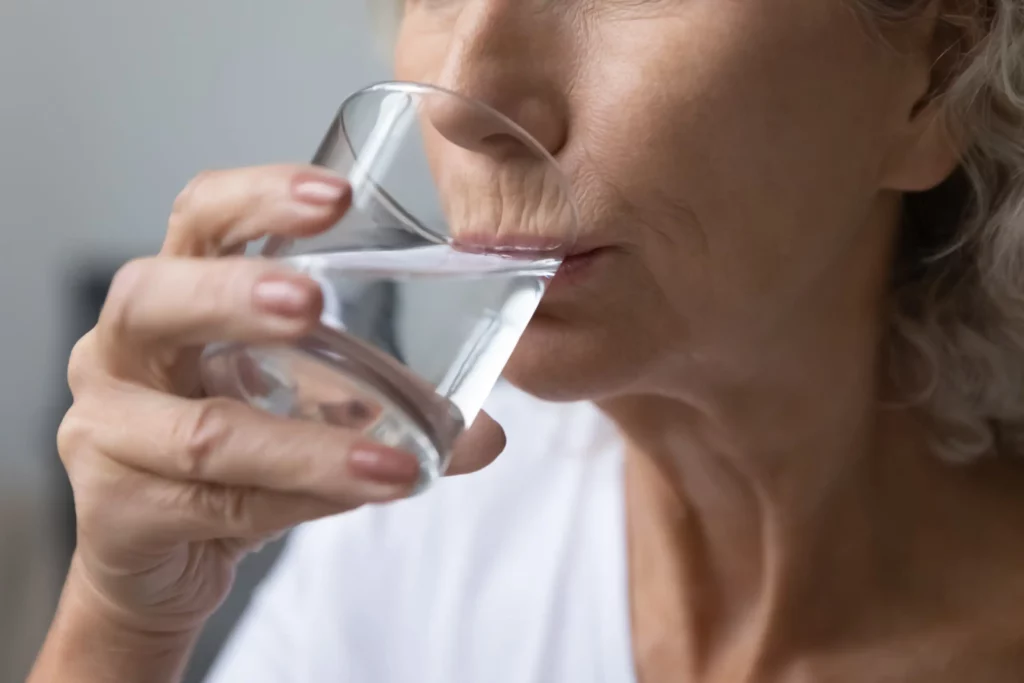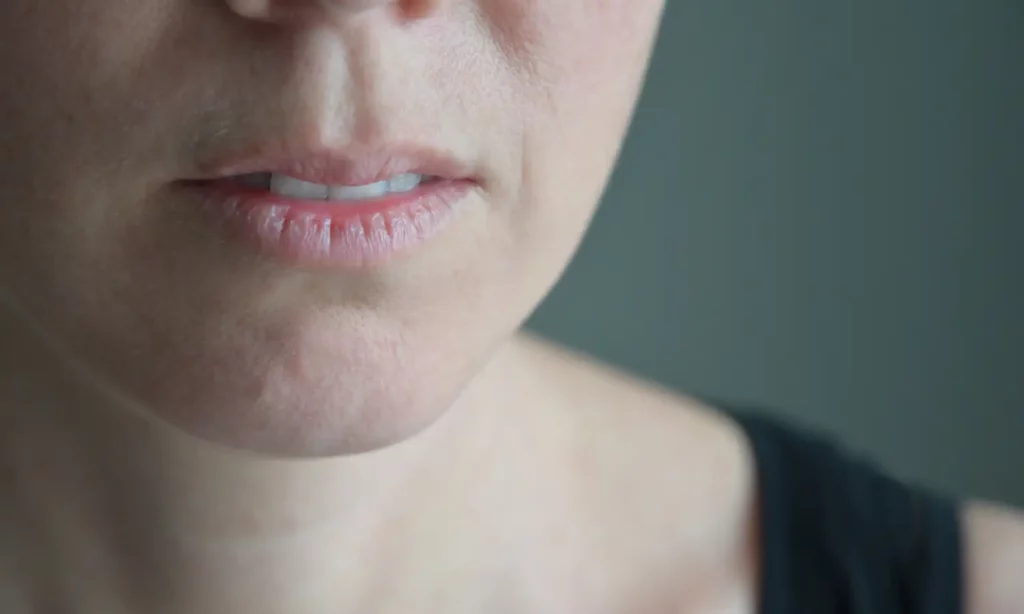Menopause – a natural part of a woman’s life where some changes pop up. We all know about hot flashes and mood swings, right? But here’s something not everyone chats about – how menopause can make your mouth feel dry. In this blog, we’re going to dig into why menopause might give you a case of dry mouth (officially called xerostomia). But here’s the cool part – this blog isn’t just about the why; it’s about the ‘what now.’ We’ll dish out some simple, yet effective natural remedies to make that dry mouth more bearable during menopause. So, stick around, and let’s make dealing with this part of menopause a bit easier!
Contents
What Is Menopausal Dry Mouth?

Yes, you heard it right – one of the lesser-known effects of menopause is that it can leave you with a case of dry mouth. But what exactly is this menopausal dry mouth, and why does it happen? Let’s break it down in simple terms.
Why Does Menopause Cause Dry Mouth?
 So, why does menopause sometimes leave you with a parched mouth? Well, let’s dive into the science behind it.
So, why does menopause sometimes leave you with a parched mouth? Well, let’s dive into the science behind it.
During menopause, two crucial hormones – Progesterone and Estrogen – take a bit of a nosedive. As estrogen starts to decline, the mucus in your mouth and nose dries up, playing a significant role in the amount of saliva your body produces. When estrogen takes a backseat, your mouth might start feeling like a desert.
But that’s not all; the drop in estrogen also triggers an increase in salivary cortisol, a stress hormone. This hormonal dance can lead to a variety of discomforts, including dry eyes, menopausal dry mouth, and even a burning sensation in the mouth.
Now, apart from menopause, let’s not forget the other possible culprits for a dry mouth:
- Medication Side-Effects: Some medicines have dry mouth as a side-effect – always good to check those info sheets!
- Sleep Apnea: Breathing troubles during sleep can contribute to waking up with a dry mouth.
- Chemotherapy: Cancer treatments, like chemotherapy, can sometimes bring on dry mouth.
- Diabetes: It’s not just about blood sugar – diabetes can also affect your saliva production.
- Stroke: Neurological factors, like a stroke, might play a role.
- Autoimmune Diseases: Conditions like Sjogren’s Syndrome can lead to dry mouth.
- Alzheimer’s: Neurological changes in Alzheimer’s patients can contribute to a dry mouth.
- Snoring: Not just a nighttime annoyance – it can dry out your mouth too!
- Open Mouth Breathing: Breathing through your mouth instead of your nose can lead to dryness.
- Caffeine: Your beloved cup of coffee might be sipping away the moisture.
- Alcohol and Tobacco Use: These vices can dry out more than just your mouth – your skin, too!
Understanding these causes is the first step in figuring out how to tackle menopausal dry mouth. Let’s move on to some practical tips to keep that moisture in check!
Effective Natural Remedies To Cure Dry Mouth During Menopause

Dry mouth during menopause can be a real bother, but fear not – there are simple and natural ways to find relief. Let’s explore some effective remedies to keep your mouth feeling comfortable and moist.
Chew & Suck Foods That Help Produce Saliva
Munching on foods that require a bit of jaw action can stimulate your salivary glands. Opt for sugar-free gum, celery, or carrots – they not only taste good but also help keep that saliva flowing.
Stay Hydrated & Ensure You Drink Enough Water
It might seem basic, but staying hydrated is crucial. Sipping water throughout the day keeps your mouth moist and helps counteract the effects of dry mouth.
Avoid Eating Foods That Dry Out Your Mouth
Certain foods can contribute to dryness. Skip overly salty or spicy foods, and steer clear of sugary snacks that might leave your mouth feeling drier.
Oral Hygiene Practices
Brush, floss, and rinse – keeping up with your oral hygiene is essential. A clean mouth is a happy mouth, and it can prevent additional discomfort.
Limit Caffeine and Alcohol, and Quit Smoking
Cutting back on caffeine and alcohol can make a significant difference. These substances can dehydrate your body, including your mouth. And yes, smoking can worsen dry mouth – another reason to consider quitting!
Ginger Sprays, Tea, and Other Ginger Products
Ginger isn’t just for spicing up your meals – it can also stimulate salivary glands. Try ginger sprays, tea, or other ginger-infused products to give your mouth a natural moisture boost.
Use a Humidifier
If dry air is exacerbating your symptoms, consider using a humidifier. It adds moisture to the air in your living space, providing relief for your mouth and nasal passages.
These natural remedies are simple but effective ways to tackle menopausal dry mouth. Incorporating these tips into your daily routine can make a notable difference in keeping your mouth feeling comfortable and well-hydrated.
Conclusion
Dealing with dry mouth during menopause is a shared journey, and by understanding its causes and implementing simple remedies, you can make this phase a bit smoother. Remember, it’s not just about the physical discomfort; your oral health is a vital part of your overall well-being.
As you embrace natural remedies, stay hydrated, and make mindful choices in your diet and lifestyle, the journey through the dry mouth during menopause becomes more manageable. Don’t hesitate to incorporate these simple tips into your daily routine, and you’ll likely notice a positive change in your comfort levels.
However, individual experiences may vary, and if you find yourself struggling despite trying these remedies, reaching out to healthcare professionals is key. They can provide tailored advice and solutions based on your unique situation.
Take charge of your well-being during menopause!
If you are facing menopause-related issues, menopause treatment at HerMantra can help. Book your free trial online menopause treatment session now.
FAQs
- What Drink Is Good for Dry Mouth?
Water is your best bet! It’s the ultimate hydrator and helps combat dry mouth. Opt for plain water or water infused with a splash of natural flavors. Avoid sugary or caffeinated drinks, as they can contribute to dehydration.
- Which Fruit Is Best for Dry Mouth?
Fruits with high water content are excellent choices. Watermelon, cucumber, and citrus fruits like oranges can help keep your mouth hydrated. Snacking on these juicy fruits can provide a natural and tasty way to combat dry mouth.
- What Tea Is Good for Dry Mouth?
A cup of chamomile tea can be soothing for dry mouth. Chamomile has anti-inflammatory properties and can help relax your senses. Opt for caffeine-free options, as caffeine can contribute to dehydration.
- What Vitamins Increase Saliva Production?
Vitamin C can play a role in saliva production. Incorporate fruits like oranges, strawberries, and kiwi into your diet. Additionally, vitamin B-complex supplements may support overall oral health, including saliva production.
- Why Is My Mouth Dry Even Though I Drink a Lot of Water?
Persistent dry mouth, despite drinking plenty of water, could be a sign of an underlying issue. Factors such as medication side effects, medical conditions, or hormonal changes during menopause may contribute. If the problem persists and makes daily activities difficult, it’s crucial to consult with healthcare professionals immediately. They can identify the root cause and guide you on the most effective solutions tailored to your situation.


